Student Blog
Jessica P.
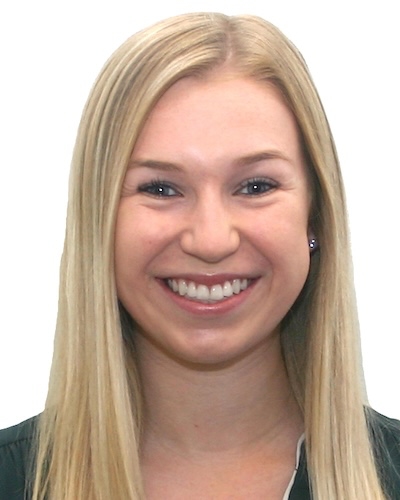
My SChedule ⟩
November 17, 2018, by Jessica P.
Classes Fieldwork School/Life Balance
As an ambassador, one of the most common questions I get from prospective students is “what does your typical schedule look like?” Along with this, people ask if there’s time to work, time for self-care, and balance in your weekly schedule. My fellow ambassadors, Joyce and Evan, recently discussed working and having a baby in grad school. From my personal experience, I think it all has to do with balance.
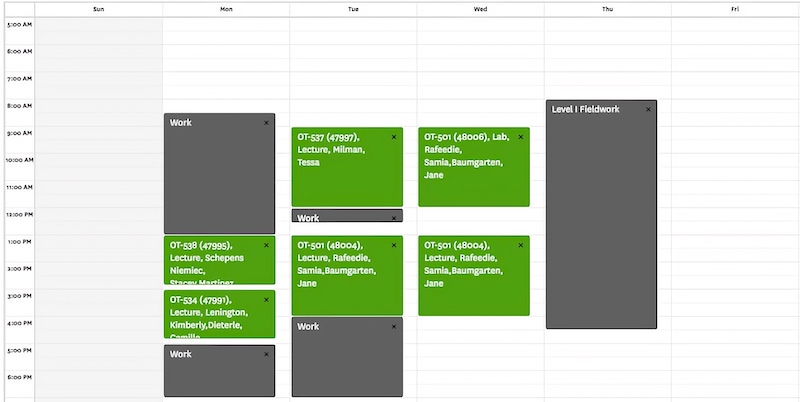
My Fall 2018 schedule
Throughout the program, it is typical to be in the classroom 3 days a week, 1 day in fieldwork, and 1 day off. For the days that we’re in the classroom, it is normal to have class 9am-12pm, a lunch break 12pm-1pm, and then class again from 1pm-4pm. For many people, like myself, a three-hour class may sound daunting, but it’s not. Luckily, all of our professors give us breaks with plenty of time to grab coffee, snacks, or simply take a quick walk outside to get some fresh air. Most of our classes utilize team-based learning, meaning that we usually are not getting a lecture for the entire class time. For example, in my Adult Physical Rehabilitation course we spend class time doing hands-on case applications where we apply what we have already studied on our own.
Everyone’s fieldwork hours will be slightly different, as you will follow whatever hours your clinical instructor works. The hours occupational therapists work may look different in the various settings. For example, my pediatrics level I fieldwork was 10am-6pm as many of our pediatric clients were coming after school. This semester, I just finished my last level I fieldwork at an outpatient lymphedema clinic where my hours were 8am-4:30pm.
As a student ambassador, I have the privilege to work 10 hours a week for the division doing various tasks and events. I have found working 10 hours per week is manageable, but it is something I have to plan for. I know that I have weekly quizzes on Tuesday, so on Sunday’s I study for my quizzes instead of cramming late on Monday night. Many of my classmates also work around 10 hours, doing other student worker positions at USC, such as being classroom assistants or research assistants. We probably would all agree that working that amount is doable, but anything more than that could be stressful on top of your coursework.
One of my favorite days though is my day off. While I love being in the classroom and at fieldwork, I depend on my day off to recharge and prepare for the upcoming week ahead. By having a day off, I think it really allows us to have a balanced schedule with time to have doctor’s appointments, work, catch up readings, etc.
Throughout grad school, there will definitely be weeks where it can feel overwhelming. My best advice is to listen to your own body and what balance looks like for you. You may need a full 8 hours of sleep while some of your classmates seem to fully function off of only 5 hours, but always listen to what is best for you. Transitioning to grad school is definitely a transition into a new role in life, but once you get a hang of the schedule and what works for you — you will own it!
⋯

From Patient to Practitioner ⟩
October 30, 2018, by Jessica P.
Growing up as a competitive figure skater, I was no stranger to frequent emergency room visits. From broken bones to run over fingers, I had it all. For me going to different orthopedic doctors and physical therapy was as much part of my weekly routine as going to school or practice. I think this is where my love of the healthcare fields grew. I knew firsthand how much different injuries impacted my own engagement in one of my favorite occupations, figure skating.
My senior year of high school, while training to compete for Team USA, I suffered an injury while practicing lifts with my teammates. I was devastated that my competitive career had to come to an end and I felt like there was a hole in my life where the sport I had dedicated my life to once was. Luckily, I was able to find ways to stay involved with the sport as I left for college. I joined the USC Ice Girls and cheered on the USC men’s ice hockey team at weekly games. I even learned how to use hockey skates for the first time in my life, which is no easy feat for a former figure skater! I felt that this experience really helped me understand some of the transitions in roles that my patients also go through when they can no longer engage in their meaningful occupations in the same way that they once did. But still, when I would meet a lot of my patients I would think to myself “I can’t even imagine what they are going through.”
And it was true, until this past year. After a complication from a routine surgery in January, I spent the first week of my spring semester in Keck Hospital of USC. This experience completely changed how I look at and approach a lot of my patients, especially when working in an inpatient setting. I finally felt I could understand what it was like to be in this unfamiliar environment, in a bed that’s not your own, and machines beeping at all hours of the night. All I kept thinking was, I want to get back to class. My biggest role at that time was that as a student and because I wasn’t able to participate in that, I didn’t know what else to do.
My interactions with my own healthcare team taught me lessons about what I liked from these providers and what I hope to provide to my patients. I think it renewed my therapeutic use of self, especially in taking an empathetic approach with everyone I encounter. While being a patient is not usually a fun experience, it was a valuable one.
⋯

OT’s Role in Lymphedema ⟩
October 16, 2018, by Jessica P.
The semester is officially in full-swing and students here at USC Chan are immersing themselves in their Level I Fieldwork experiences. As part of our Level I Fieldwork, about halfway through the semester we have classes cancelled for the entire week and we get the opportunity to go to our fieldwork site for the whole week. This allows us to really see what it is like to be an OT in this practice setting. Last week, us second years had our full week and are now back on campus prepping for the second half of our semester.
As part of my adult physical rehabilitation practice immersion, my fieldwork this semester is at an outpatient oncology and lymphedema clinic at Providence Holy Cross Medical Center. If you are anything like me, you may be unfamiliar with what OT’s role in lymphedema is. My clinical instructor is a Certified Lymphedema Therapist (CLT), which is considered an advanced practice area within OT.
But wait . . . what even is lymphedema? When lymphedema occurs in oncology patients, it is called secondary lymphedema. This is when the lymph vessels aren’t able to adequately drain lymph fluid, usually from an arm or leg. Most of the patients that I see are breast cancer survivors who experience lymphedema of the arm or trunk. As part of their OT treatment, they come in for manual lymph drainage, which is a gentle massage guiding the lymph fluid towards areas where there are still good lymph nodes in the body.
OTs also have a critical role in educating and training patients on lifelong management of this chronic condition. It is complex and multi-faceted so OTs may utilize all different interventions such as kinesiotaping, low-level laser therapy, scar mobilization, cupping, and so much more.
One of the biggest things I learned throughout my full fieldwork week was how OTs really play a role in enabling a patient to advocate for themselves. Many of our patients come to us after years of experiencing lymphedema. They haven’t received the treatment they need and have given up. We have the important role of being able to give them hope again, while utilizing an evidence-based practice and allowing them to engage in their meaningful occupations again!
⋯

Teamwork Makes the Dream Work ⟩
October 1, 2018, by Jessica P.
One of my favorite parts of the USC OT program is that our learning doesn’t just stop in the classroom. Whether it’s going out to a hospital for fieldwork or to skid row to volunteer at the USC Student-Run Clinic (SRC), there are endless opportunities to apply our OT knowledge. One of the amazing opportunities we have to get involved through our Adulthood and Aging course is the Interprofessional Geriatrics Curriculum (IPGC).
IPGC is a chance for us to work with students from different disciplines including physical therapy, medicine, physician’s assistant, pharmacy, social work, and psychology. We get divided into teams and then paired with an older adult living in a low-income community housing complex.
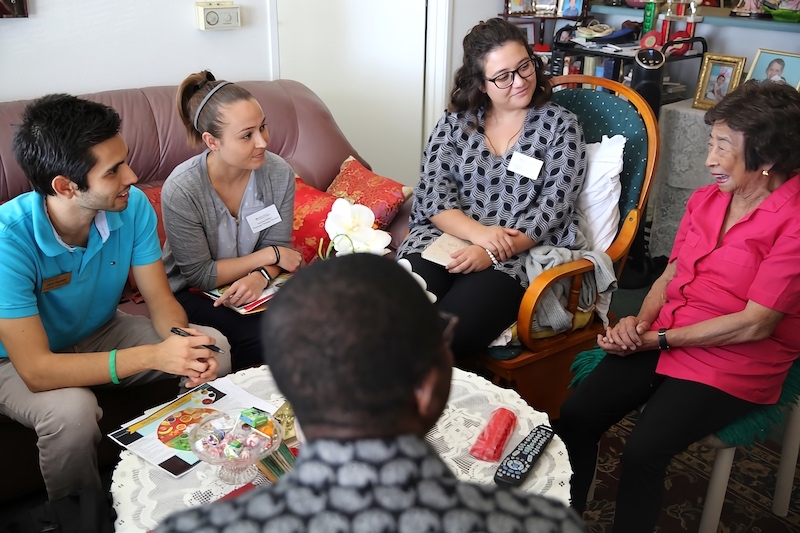
IPGC students meeting with their resident. Photo credit: Claire Norman, MSJ (courtesy of the Keck School of Medicine of USC)
Throughout the semester we spend a few Friday afternoons at the community housing complex where we get brief lectures on topics related to our visit, such as oral health, cognition, fall prevention, and psychosocial issues. After our lecture, we meet with our older adult to learn more about them and apply what we learned during our lecture.
This past Friday, I had my first IPGC visit where we started out the afternoon with a lecture on medication management and nutrition in older adults. Professors from pharmacy and medicine gave us resources, such as the Beers list, to utilize in our future practice.
After our lecture, we broke up into our teams and met our older adult who we will be working throughout the rest of the semester. We spent a lot of time building rapport with our resident and getting to know her story. My teammates and I discussed her various medications and different side-effects that may occur from those. As an OT student, my main role was teaching her how to utilize a pill box organizer and implement taking medications into her daily routines. We also discussed the importance of healthy, balanced meals and how this can influence the aging process.
The afternoon flew by so quickly that we were all sad to have our time come to an end. I felt as if we really got to know our resident and build rapport with her. After we met with our resident, our team debriefed on what went well for us as a team and identified strategies to improve on for next time. As occupational therapists, we often work in teams so learning how to navigate conflicts and communicate effectively is key and IPGC is the perfect place to begin practicing this.
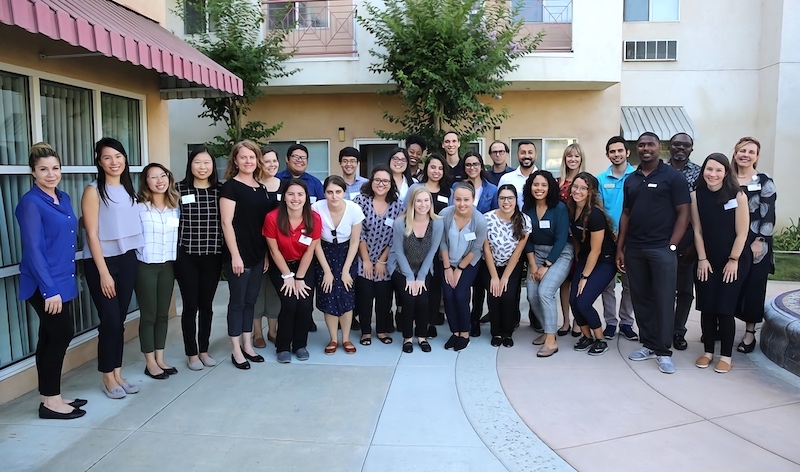
IPGC students. Photo credit: Claire Norman, MSJ (courtesy of the Keck School of Medicine of USC)
⋯

Get Involved ⟩
September 17, 2018, by Jessica P.
Here at USC in addition to our amazing coursework and electives, we have so many opportunities to get involved. Many of our students are involved in professional and volunteer-based organizations and groups. Figuring out what student groups may interest you can sometimes be overwhelming, so here is a summary of the groups our OT students are so passionate about:
Engage is the OT House’s community outreach program which fosters relationships between USC graduate students and our surrounding community. OT students volunteer by designing and participating in recreational activities for at-risk elementary school children.
Occupational Therapy and Science Council (OTSC) consists of every student in the Chan Division and has an executive board of members who work diligently to represent all interests of the student body. They create opportunities for our students to engage in philanthropic learning opportunities, to attend talks surround practice areas of interest for professional development, as well as create a sense of community amongst the Chan Division.
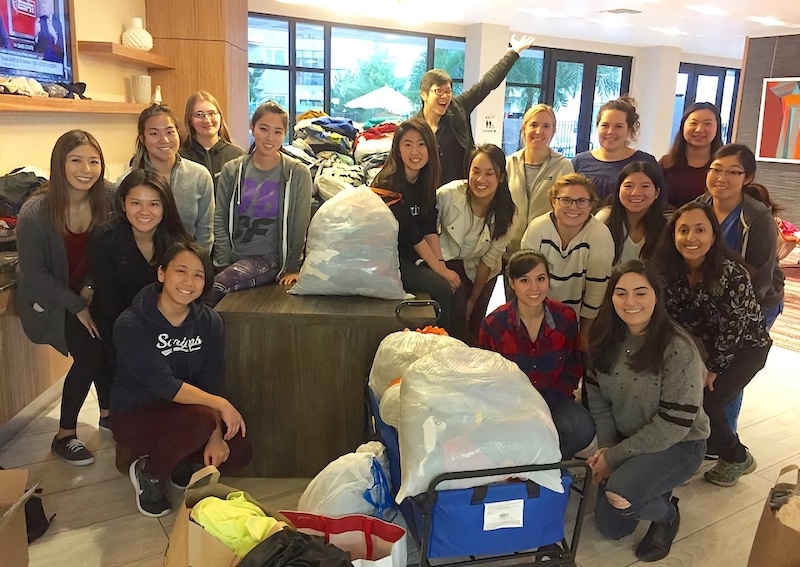
Members of OTSC volunteering
OTs for OuTreach builds and strengthens the sense of community for LGBTQ students and allies by providing opportunities for social engagement and professional development. OTs for OuTreach members volunteer through developing programs and implementing engaging activities for diverse, marginalized and underserved populations. This organization has previously worked with the USC LGBT Resource Center, the Los Angeles LGBT Youth Center, and the Los Angeles County Central Juvenile Hall.
Pi Theta Epsilon (PTE) is the national honor society for occupational therapy students and alumni. PTE at USC sponsors various events throughout the year to promote student scholarship, showcase student and faculty research and engage in interdisciplinary work.
The Pre-OT Club is open to all USC undergraduate students who are interested in learning more about the field of occupational therapy. The Pre-OT club hosts events such as visits to OT practice sites, opportunities to shadow practicing clinicians, networking opportunities, and advisement for the application process for the Entry-Level Master’s program.
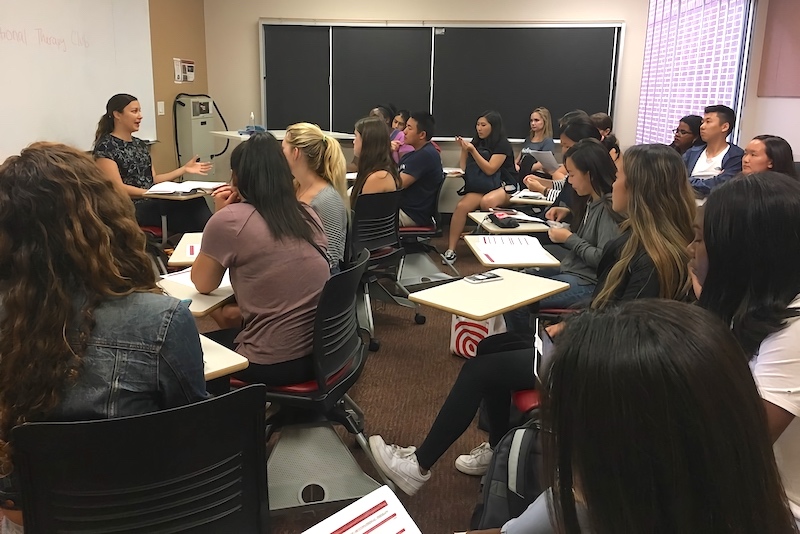
Pre-OT Club members participating in a Q&A session with assistant director of admissions Amber Bennett
The USC Student-Run Clinic (SRC) delivers quality patient care to the underserved people of Los Angeles and enhances health professional education through an inter-professional, team-based approach to health care. Students from four professions (occupational therapy, medicine, pharmacy, and physician assistants) work together to assess, diagnose and optimize the patient’s health and lifestyle to suit their individualized needs.
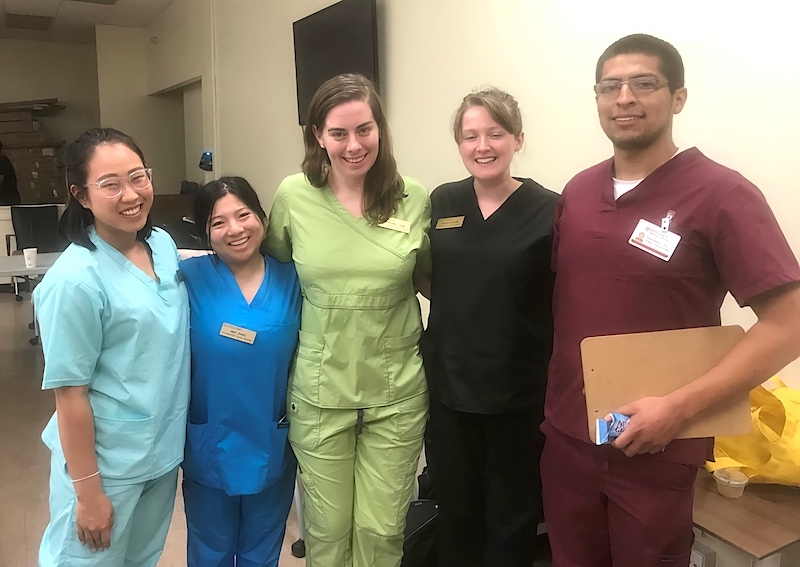
OT students at the Student Run Clinic
⋯





